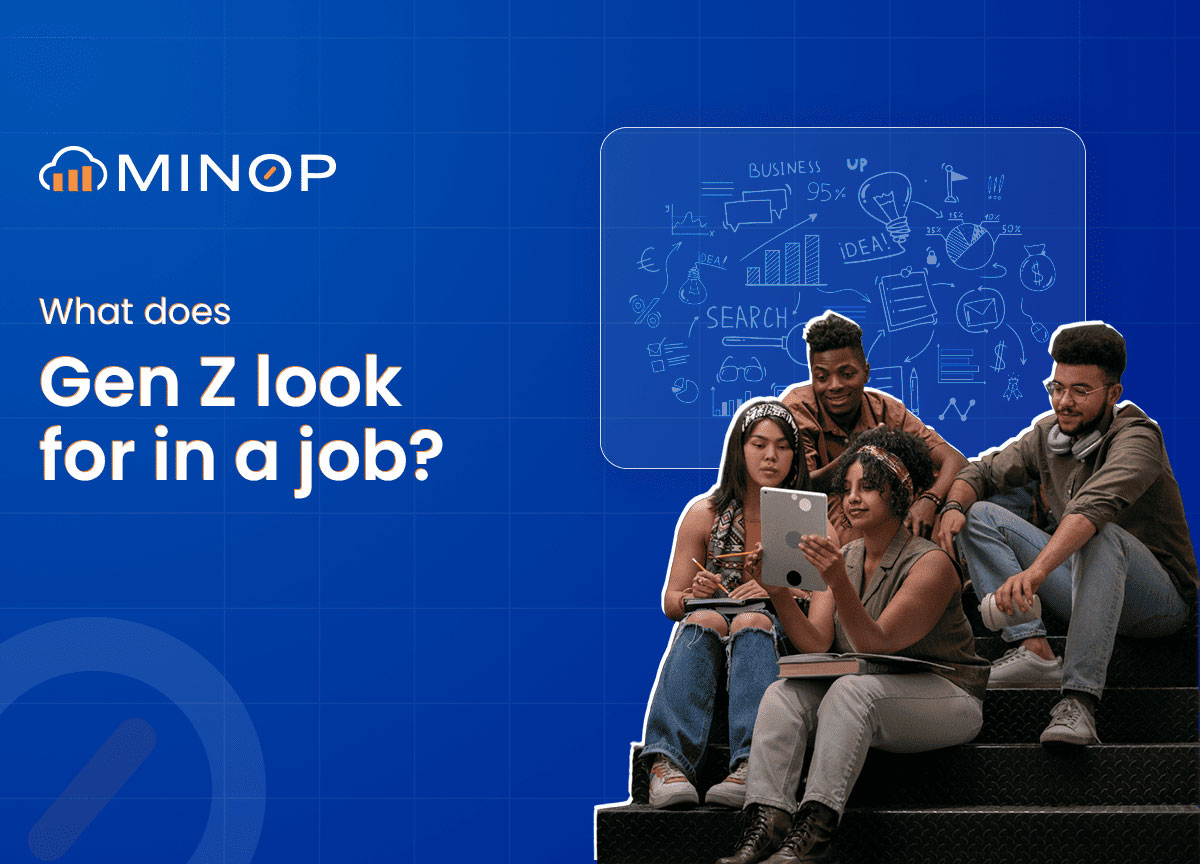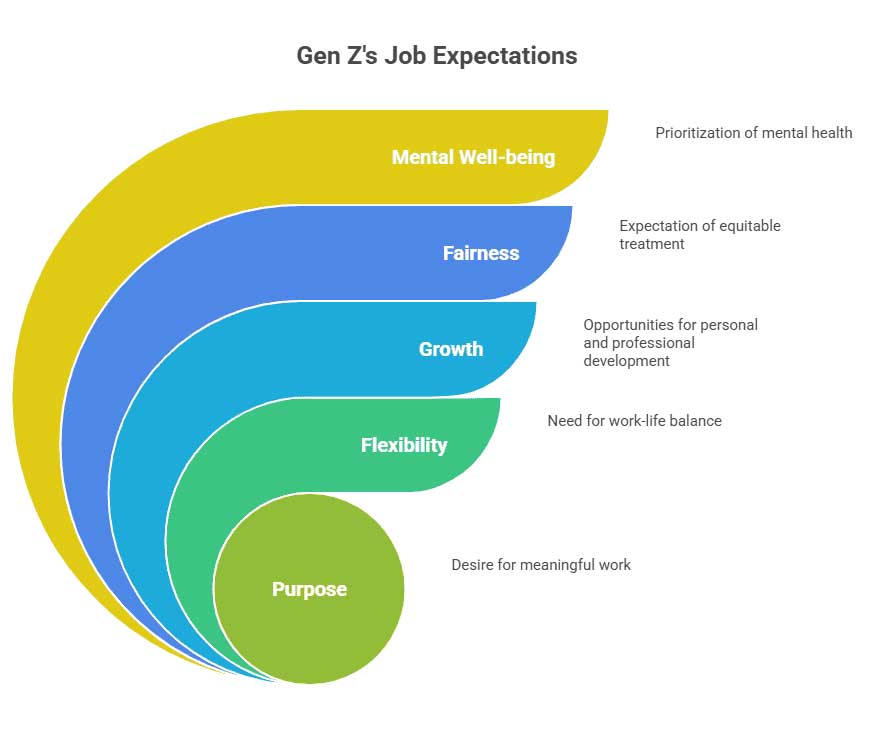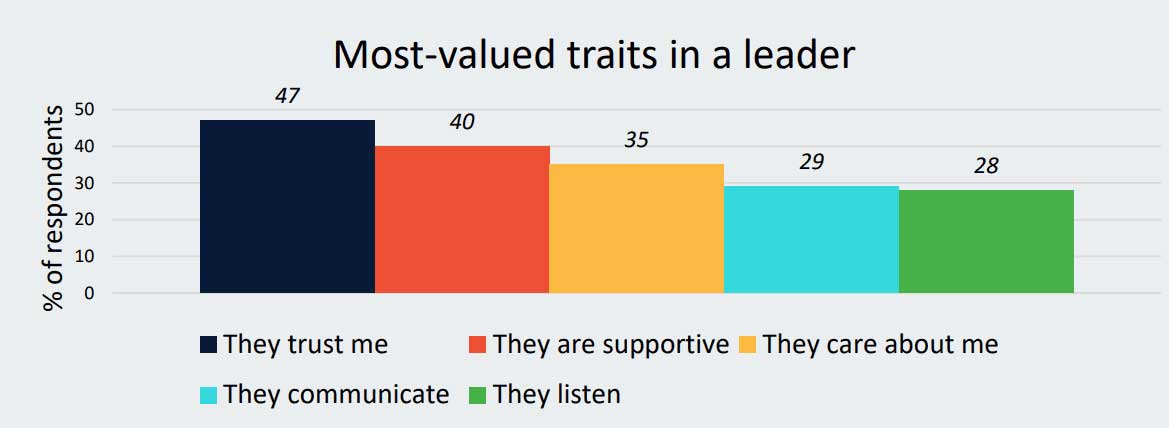What does Gen Z look for in a job?
Posted On:- 4 September, 2025 By:- Vaibhav Maniyar
Introduction
A new wave of candidates, born after 1996, is entering the workforce, and they are just as ambitious and determined as any generation before them. They are reshaping employment policies that others have only attempted to change. One thing is clear: everyone wants highly skilled individuals who can think critically, act decisively, and remain fearless in their decision-making.
Let's take a closer look at this generation – Gen Z. What do they seek in a job after graduating from college? What factors influence their decision to join a company? Where can you find them, and how can you design a hiring process that engages them without the delays typical of previous generations?
This blog explores these questions and suggests interview questions that can serve as an excellent starting point before diving into role-specific discussions. Furthermore, find some interesting questions at the end that can serve as an excellent starting point before diving into role-specific discussions.
Corporate Gen Z in Numbers
Before we delve into what Gen Z candidates look for in a job, here are some key statistics from Deloitte's 2025 Gen Z and Millennial workplace survey:
- 86% value a company's commitment to diversity.
- 54% avoid applying to firms with outdated hiring methods.
- 51% still prefer face-to-face communication despite digital fluency.
It's crucial to remember the sheer scale of this generation. Born from 1995 onwards, Gen Z already surpassed Millennials in global population share in 2019, comprising 32% of the population to Millennials' 31.5%. By 2025, Gen Z is expected to make up 27% of the global workforce. This generation, along with Millennials, will soon dominate the talent pool, making it imperative for businesses to understand their unique motivations.
Sure, every generation comes with its own values and ambitions. But what makes this one different? Let's start by looking at what Gen Z really wants from a job.
What does Gen Z look for in a job?

Four- or five-day workweeks, flexible hours, on-time salaries, a good brand name, and paid leave are benefits that employees of any age or generation value. It's pretty clear that employees of any age, regardless of generation, care about these things and often ask about them right after the first interview round.
But here's where Gen Z stands out: they look beyond the basics. If your company's culture doesn't match their values or perception, they won't hesitate to walk away. Your response to these questions needs to be honest, grounded, and a true reflection of how your company operates to avoid sounding disingenuous. Otherwise, you risk high attrition rates without ever really understanding why.
Here's what you need to know about what they really look for in a job.
Work-Life Balance
Gen Z see work-life balance as key to staying productive and avoiding burnout. They want jobs that give them the freedom to manage their own time and trust them to get things done. As natural tech-savvies, they gravitate toward roles that support remote or hybrid work, where technology makes flexibility a reality, not just a promise.
Values Alignment
This generation is deeply purpose-driven and wants their work to mean something to reflect their personal values and contribute positively to the world. They are not satisfied with just "doing their job"; they want to solve real problems, make a difference, and work for companies whose mission feels genuine and aligns with their own beliefs.
Diversity and Authenticity
Gen Z cares deeply about inclusion and authenticity. They expect workplaces that embody their DE&I values, not just state them. They want to see representation, respect, and openness built into the company culture. In fact, more than two-thirds of Gen Z candidates say they'd hesitate to accept a job offer if they didn't meet any underrepresented employees during the interview process. They also expect mental health to be taken seriously, communication to be open, and company language to be honest and transparent.
Feedback and Development
For Gen Z, learning never stops. They want clear career paths, opportunities to grow, and workplaces that invest in their development whether through online learning, mentorship, or certifications. What distinguishes them is their need for consistent feedback. Unlike older generations who might have waited for annual reviews, Gen Z thrives on regular check-ins and conversations that help them improve and feel connected to their team.
Financial Expectations
Growing up during economic uncertainty has made Gen Z realistic and financially aware. Many are managing student loans or high living costs, so they care about fair pay and financial transparency. Competitive salaries, strong benefits, and clear opportunities for financial growth matter far more to them than superficial perks like free snacks or office games.
Work Environment
Gen Z grew up online they're digital natives through and through. They expect their workplaces to reflect that. Outdated systems or slow tools can frustrate them quickly. They prefer modern, efficient tech setups and collaborative platforms that make teamwork easy and smooth. For them, innovation and the right tools aren't bonuses they're the baseline for doing great work.
Many Gen Z employees feel their managers do not understand their needs when it comes to growth and development. They don't want someone just checking in on their daily tasks they want someone who can guide them, inspire them, and help them figure things out along the way.
And the stats back that up. Yello found that around 17% of Gen Z candidates expect a job offer within a week of their first interview, and only 6% say their biggest career goal is reaching a leadership role. In other words, they're not really into strict hierarchies or old-school career ladders. What drives Gen Z is meaningful work, opportunities to learn new things, and the feeling that what they are doing makes a difference.
Where to find Gen Z talent?
Finding top Gen Z talent requires more than just posting a job online. While talent acquisition experts can search websites for resumes or share openings on social media, the presentation of your roles makes a significant difference. Using modern, professional language or creating short-form content like Reels or YouTube Shorts can help you connect with the right candidates.
To succeed, you need a multi-channel approach that fits this digitally native, purpose-driven generation. Here's what the numbers tell us:
Direct Referrals and Networks
Over 60% of Gen Z students say referrals from current or former employees are their favorite way to learn about potential employers. That means your existing team is your best recruiting tool. Encourage employees to share glimpses of their work life on social media and post about open positions. This gives candidates an authentic sense of your company culture and builds trust from day one.
In-Person Recruitment
Campus hiring events are still one of the most effective ways to reach Gen Z. In fact, these events rank nearly twice as high for Gen Z candidates compared to Millennials. Why? Even though Gen Z is digitally fluent, they still value face-to-face interactions and personal connections. Fresh out of college, they often have strong ties to universities and appreciate recruiters who engage with them regularly and personally. While email is still their top communication channel, they also expect instant messaging, video calls, and other quick ways to connect.

Social Media Platforms
Gen Z lives online, and social media is where they spend most of their time. They can quickly spot companies that are innovative or stuck in old ways. To attract the best talent, strengthen your presence on platforms like Instagram, Snapchat, and LinkedIn, and make sure your website especially your careers page is mobile-friendly and engaging. Many companies even use these platforms to offer internships or part-time roles, giving candidates an immediate way to experience the company.
Considering Freelance Talent
Around 50% of Gen Zers work as freelancers, whether due to barriers in permanent employment or a desire for flexibility. Don't overlook this talent pool. With today's communication tools, remote teams can collaborate seamlessly, making freelance talent just as valuable as full-time employees.
How do you attract Gen Z candidates?
By now, you've seen what Gen Z really looks for in a job, explored the key numbers that define this generation, and learned where to focus your recruitment efforts to find the best talent. While generational traits provide a useful framework, it is important to remember that not every Gen Z employee behaves the same way.
The real question is this: from your perspective, how can you attract the most relevant, high-potential candidates, and why? Yes, they value meaning, fairness, and a sense of belonging. However, your recruitment approach is what will ultimately make the difference.
Here are some effective strategies to attract Gen Z talent:
Highlight Purpose
Gen Z wants to feel that their work matters. When you're crafting job descriptions or talking about your company, focus on the bigger picture. Show how the role contributes to meaningful projects, solves real problems, or impacts the community. Candidates are drawn to companies that align with their personal values and allow them to make a difference.
Offer Flexibility
Whether it's remote work, flexible hours, or hybrid options, give candidates a sense of control over their schedules. A company that respects personal time and prevents burnout will naturally attract Gen Z, who prioritize balance as much as career growth.
Be Transparent
Gen Z is hungry to learn and grow. Make it clear how your company invests in professional development, whether through mentorship programs, online courses, certifications, or stretch projects. They want to know there's a path forward and that their efforts will be recognized and rewarded.
Communicate Honestly
This generation thrives on feedback and authenticity. Keep communication open and transparent, from the interview process to onboarding and beyond. Regular check-ins, constructive feedback, and honest discussions about expectations build trust and loyalty.

Use Social Media
If you want to reach Gen Z where they are, meet them online. Use social media, short-form videos, and interactive content to showcase your company culture. Make your career site mobile-friendly and engaging. This kind of technology-enabled hiring experience promotes a good response to your job listing.
Celebrate Diversity
Show that your workplace celebrates different backgrounds, perspectives, and experiences. Foster a culture where mental health, belonging, and respect are priorities. Gen Z wants to work somewhere they feel seen, heard, and valued.
Tap Into Referrals
Encourage employees to share openings with their networks and talk about their experiences online. Referrals not only attract quality candidates but also give newcomers an authentic glimpse into what it's like to work at your company.
Gen Z Interview Questions
Move beyond the classic, "So, tell me a bit about yourself." Gen Z candidates respond best to interview formats that feel fresh, situational, and reflective of real workplace scenarios. Instead of simply asking about their background, try blending the role's responsibilities with cultural and mindset-based questions. This approach gives you a deeper perspective on how they might fit within your team and company.
We've put together a set of specialized "Gen Z Litmus Test Questions" that cover key areas, from tech fluency to adaptability. You can pick and choose based on the role you're hiring for.
To get a feel for how you approach your work, we wanted to ask you, if you don't know where to start a task that has been given to you, what's your first instinct? What would you do?
Which app or tool would you say you rely on the most?
Let's talk about what motivates you. Alright? If you had two offer letters in your mail, one with a higher-paying role with repetitive routine tasks vs a job with an average salary but full creative freedom, what would you choose?
On the subject of leadership, what do you value more in a manager? Is it someone who's a coach, guiding you day-to-day, or do you prefer someone who gives you the space to work independently and checks in on your results weekly?
Do you think it's important for an employer to take a public stand on social or environmental issues?
What suits you better - break a long-term project down into smaller sprints, or do you prefer to switch between different tasks to keep things fresh?
And on that note, do you thrive on juggling multiple projects at once, or do you prefer to focus on mastering one thing at a time?
When it comes to giving feedback, where do you feel most comfortable? Is it something you'd rather do face-to-face, over a chat, or do you prefer the option of giving feedback anonymously?
Remember: start with role-specific questions, then move on to critical thinking and problem-solving exercises to help identify top-tier candidates.
Is Your Company Ready for What Gen Z Seeks?

While some might assume a digital-native generation would prefer isolation, the data tells a different story. Despite being digitally connected, a significant portion of Gen Z still prefers face-to-face communication, seeking authentic and real relationships in the workplace. They value human connections and wish to bond with co-workers in a relaxed, informal environment. In fact, 47% express a desire to work in such an atmosphere.
This generation also brings a distinctive outlook on career progression and work-life balance. An average Gen Z professional is projected to hold 17 different jobs, experience 5 career shifts, and live in 15 different homes during their lifetime a stark contrast to previous generations. Their aspirations are less about climbing a traditional ladder and more about impact and personal fulfillment. Interestingly, while only 6% prioritize reaching a leadership role, 32% expect to hold a managerial position within 5 years of graduating, suggesting a desire for influence and responsibility early on.
They're also driven by autonomy and flexibility, with 44% having a preference for flexible working hours. Moreover, they value jobs that allow them to make an impact and integrate with their personal life, rather than drawing a strict line between the two. They are entrepreneurial-minded, innovative, and more open to diverse and international activities. This open-mindedness extends to their colleagues, as they are often more tolerant and enjoy having co-workers of different nationalities or races.
While they may be optimistic about their careers, with more than half expecting to work for 2-6 companies professionally, their focus remains on continuous learning, meaningful contribution, and a work environment that supports both their personal and professional growth.
Final Thoughts
Integrating Gen Z into your company marks the beginning of a new era, bringing fresh perspectives free from old biases and a wealth of pragmatic talent. However, retention is the primary challenge. This generation seeks purpose, authenticity, and flexibility more than just a paycheck. To succeed, companies need streamlined hiring processes, continuous and genuine feedback, and a culture where inclusivity is practiced, not just preached. Therefore, you must ask: Are your roles truly flexible? Is your culture genuinely open? Is your feedback consistent enough to inspire this transformative wave of talent? The future of your workplace depends on it.
FAQs
What are Gen Z's top job search sources?
Employee referrals are Gen Z's most effective job source. Over 60% prefer learning about opportunities from current or former employees. Roughly 17% anticipate a job offer within one week of their initial interview, highlighting a preference for efficiency.
Is it true that Gen Z only wants to communicate digitally?
No, that's a common misconception. Despite their digital fluency, 51% of Gen Z employees still prefer face-to-face communication. They seek authentic relationships and value bonding with co-workers in a relaxed, real-world environment.
What are Gen Z's career ambitions?
Gen Z's career ambitions are not traditional. Data shows that only 6% of Gen Z state that their primary career goal is reaching a leadership role. However, this does not mean they lack ambition; 32% expect to be in a managerial position within five years of graduating. This suggests they are less interested in titles and strict hierarchies and more focused on gaining influence and making a tangible impact early in their careers.
How loyal is Gen Z to a single company?
They are not expected to be lifelong employees. Projections indicate that an average Gen Z professional will hold around 17 different jobs and navigate 5 career shifts in their lifetime. More than half believe they will work for 2-6 different companies. Their loyalty is more to their personal growth and values than to a specific organization.
What does the ideal work environment look like for a Gen Z employee?
They thrive in environments that are relaxed, informal, and flexible. 47% want a fun, informal atmosphere, and 44% prioritize flexible working hours. They also value diversity and enjoy working with colleagues from different backgrounds. Interestingly, despite this desire for a collaborative atmosphere, many also appreciate having their own enclosed workspace.

Comments